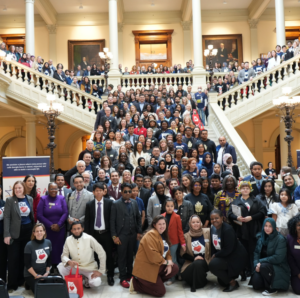Last week, our team members Isabel and Miro had the privilege of participating in the inspiring New Americans Celebration at the Georgia State Capitol. Throughout the busy halls of the state’s capitol building, the group of over three hundred advocates gathered to speak out for or against policies with the potential to greatly impact the lives of immigrants and refugees in our Georgia community.
From positive legislation championing immigrant physicians to receive their medical license in order to practice in the U.S. to harmful legislation intended to further perpetuate marginalization and anti-immigrant rhetoric, the day of advocacy highlighted the importance of voicing our opinions to those who represent us in government. In this blog post, we’re excited to share insights from the event, highlighting the policies and empowering you to join the movement in advocating for immigrant rights in your community.

Can you spot Hope’s Miro and Isabel in the crowd?
Relicensing for Immigrant Healthcare Professionals, GA SB 142
Last year, New Americans Day advocates spoke to their representatives about Georgia’s critical shortage of physicians and the need to create pathways for foreign-trained physicians to become licensed to practice in the U.S. While there wasn’t a bill at the time, lawmakers have worked extremely hard over the past year and were finally able to introduce Senate Bill 142 to champion this exact cause!
As many Georgians may know, our state faces a critical shortage of healthcare professionals, with many counties lacking essential services. Currently, 82 counties have no OBYGNs, 65 have no pediatricians, and 9 have no doctors at all. However, 26% of newly arrived healthcare professionals who are fully qualified and certified in their home countries remain underemployed. Due to current laws, it is nearly impossible to practice as a physician in the U.S. if you were not licensed here and without having to go through the entire training process from the very beginning.
Because of licensing barriers, we are not only perpetuating the physician shortage in Georgia, we are preventing capable physicians from practicing in the field they dedicated years of their lives training for, all because they were born in a different country. With SB 142, Georgia can create simpler pathways for foreign-trained healthcare professionals to get licensed, which would be a game-changer. Other states, such as Tennessee, Alabama, and Florida have already implemented similar initiatives, so it is only logical that Georgia follow suit. Georgians would finally get the care they need, while immigrant healthcare workers could return to the field they trained for.
We sincerely hope that our Georgia Senators choose to vote in support of this bill.
Making Local Law Enforcement an Extension of ICE, GA SB 21
Senate Bill 21 is an anti-immigrant bill that forces local law enforcement to act as an extension of ICE. This bill, which was passed by the Senate on February 13th, is alarming for a number of reasons.
First and foremost, requiring law enforcement to also enforce immigration laws, it undermines public safety and harms Georgia’s economy. When immigrants in our communities do not feel safe reporting crimes to the police, everyone’s safety is at risk. Additionally, as a firm that works closely with vulnerable populations, such as survivors of crimes, trafficking, and domestic violence, there is a legitimate fear of clients no longer feeling safe in reporting their experiences to law enforcement. This will only create more barriers to reporting crimes and seeking justice, as well as access to their pathway to lawful status.
This bill is also cost-ineffective for our taxpayers. SB 21 imposes costly, underfunded mandates on local governments and diverts law enforcement resources away from public safety. Right now, law enforcement officers do not receive enough training as it is for the services they provide currently. Adding immigration enforcement to their list of responsibilities will only exacerbate this issue.
If this bill is signed into law, it puts everyone at risk of racial profiling and increased civil violations, even immigrants with status, leading to harm for our immigrant communities and beyond.
Furthermore, this bill jeopardizes Georgia’s economy, which relies on immigrant workers in key sectors, such as agriculture, construction, and hospitality. Without immigrant labor, our economy will greatly suffer.
Most importantly, it should be noted that simply being undocumented is not a crime. While it is a civil issue, undocumented immigrants are not inherently criminals, and therefore law enforcement has no business in making immigration decisions outside of their jurisdiction.
Lastly, we already have many similar bills in place, such as Georgia House Bill 1105 which was passed last year, and the Laken Riley Act at the federal level. Lawmakers should focus their time on making positive changes in our communities, rather than drafting redundant legislation that perpetuates anti-immigrant rhetoric.
Now that SB 21 has been passed on to the House, we sincerely hope that our Georgia representatives choose to vote against this bill.
Excluding Certain Immigrant Students From Dual Enrollment Programs, GA HB 18
House Bill 18 proposes to exclude undocumented students, DACA recipients, and parolees from participating in dual enrollment programs, denying them critical educational opportunities. However, many of these groups already face severe restrictions in accessing higher education, as undocumented students in Georgia are barred from in-state tuition and admission to certain public colleges and universities. By targeting them yet again, this bill does little more than reinforce systemic barriers that have long been in place, effectively shutting the door on students who are already marginalized.
Denying access to these programs limits students’ potential and creates unnecessary hurdles to workforce employment, ultimately harming Georgia’s economic future. Many of these students have grown up in Georgia and have known no other home, yet they continue to be excluded from the very opportunities that would allow them to succeed and contribute. By allowing our immigrant communities to access proper education, we are preparing them to become skilled professionals, taxpayers, and community leaders—benefiting not only them but Georgia as a whole. Equal access to education is vital for a strong, competitive state that values talent and hard work over immigration status.
If this legislation passes, which we sincerely hope it does not, it will shape Georgia’s future—economically, socially, and morally. This bill is not about protecting resources or strengthening education; it is a political move designed to instill fear and perpetuate discrimination against immigrant communities. Supporting refugee and immigrant students ensures that Georgia remains a place of opportunity, where all residents, regardless of background, have the chance to contribute, thrive, and help build a more prosperous and inclusive future for us all.
We sincerely hope that our Georgia House Representatives choose to vote against this bill.
How You Can Help
Your voice matters, especially when it comes to advocating for yourself and your community. Never underestimate the power of speaking up—reaching out to your state or federal representatives can make a real difference. Remember, they work for us! They rely on hearing from constituents like you to effectively represent your interests. And remember—our congressmen represent all residents in their district, regardless of immigration status. As a member or ally of the refugee and immigrant community, your perspective is essential. Lawmakers need to fully grasp how their decisions impact the people they serve, and your voice plays a crucial role in ensuring that happens.
Connecting with your representatives is easier than you might think. You can call, email, send a letter, or even meet with them in person. Not sure who your representatives are or how to get in touch? You can find that information here.


